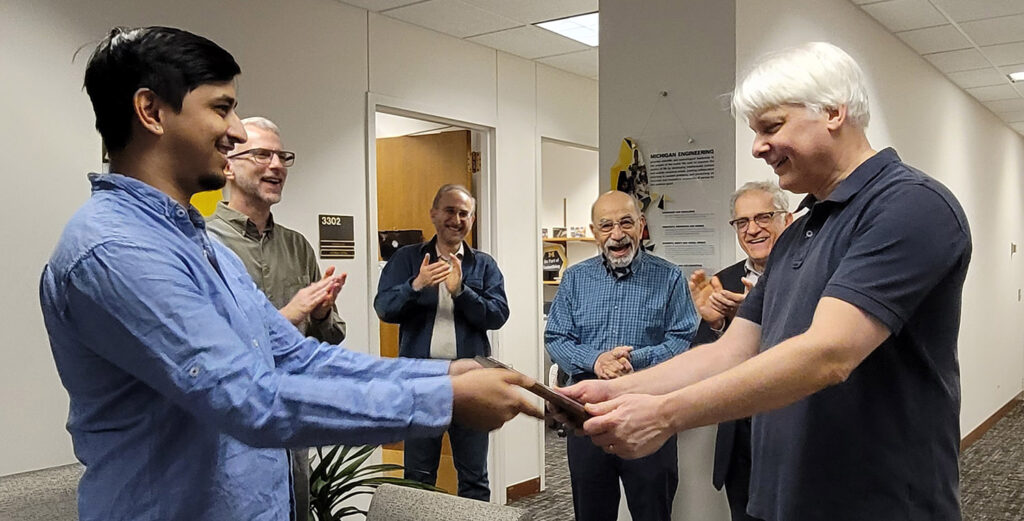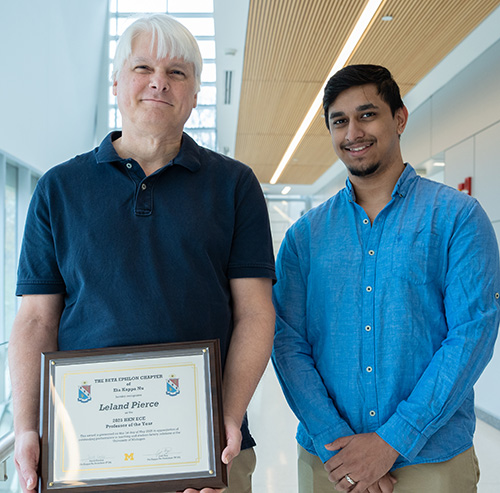Leland Pierce receives 2025 HKN Professor of the Year Award for ECE

Dr. Leland Pierce earned the enviable title of 2025 HKN Professor of the Year for ECE after a vote by all ECE students. The voting was overseen by the Beta-Epsilon chapter of Eta Kappa Nu (HKN), the national honor society for electrical and computer engineers.
Pierce joined the department in 1991 as an Assistant Research Scientist after receiving his undergraduate and graduate degrees in Electrical Engineering from Michigan. He began teaching courses in 2016, and in recent years has become a primary instructor for EECS 200: Electrical Engineering Systems Design I.
EECS 200 is a new core course that was first introduced into the electrical engineering curriculum in 2019. Pierce helped design the labs, and was one of the first two faculty to teach the course, which turned out to be the semester before COVID struck.
To ensure the students were able to get as realistic a lab experience as possible while at home, he spent the summer of 2020 developing software to mimic the lab setup. Instead of moving equipment physically, students made clicks in a browser to grab wires, connect cables, and run the virtual sensors, Arduinos and cameras. Once students returned to in-person labs, he reverted to hands-on instruction.
His concern for how students learn has always been forefront in his mind, so this award is particularly meaningful to him.

“Winning this award means that the effort I’ve made to modify how I teach has actually made a difference to the students, which is what is most important to me,” said Pierce. “The redesign of the lectures, the labs, the homeworks, and my office hours was a major task, and I’m so happy that it really helped. Helping the students learn better has been my most important goal, and I plan to continue trying new ideas in the hope that things can still be improved.”
In addition to EECS 200, Pierce has taught EECS 215 (Intro. to Electronic Circuits), EECS 230 (Electromagnetics I), EECS 314 Electrical Circuits, Systems, and Applications), ENGR 100 (Human Power Generation), and three additional courses at the 400 level. He also developed a project-oriented course called “Image Processing in Remote Sensing” for the College of Engineering (COE)’s Multidisciplinary Design Program, and mentored numerous students with their individual projects at the undergraduate and graduate level, for which they received course credit.
Remote sensing was Pierce’s area of interest as a research scientist. More specifically, he has focused on microwave SAR sensors, radar systems, communication channel modeling, and image processing. He is an advisor to the U-M Student Chapter of the IEEE Geoscience and Remote Sensing Society (GRSS), and Chair of the local chapter of the IEEE GRSS. Pierce has received a COE Ted Kennedy Family Faculty Team Excellence Award for his contributions as Assistant Director of the Micro Autonomous Systems Technology (MAST) Center for Microelectronics. His teaching and mentoring-related awards include EECS Outstanding Achievement Award for work with EECS 200, COE Outstanding Student Group Advisor Award, and CoE Jon R. and Beverly S. Holt Award for Excellence in Teaching.
 MENU
MENU